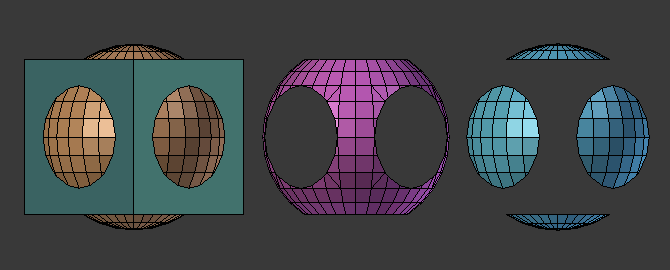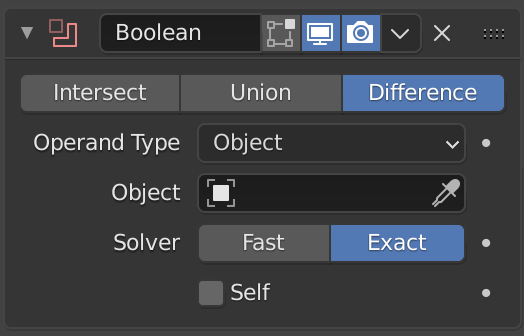Boolean Modifier¶
The Boolean modifier combines multiple meshes using a Boolean operation.

Applying the modifier to a sphere and creating the Intersection, Union, and Difference with a cube. The cube is hidden for a better view.¶
Opozorilo
Only Manifold meshes are guaranteed to give proper results. Non-manifold ones (especially meshes with holes) will usually work well, but might give odd glitches and artifacts.
Nasvet
If you have marked your objects to show the edges (in , enable Wireframe), you will see the edge creation process while you are moving your objects around. You can also enable X-Ray to see inside the objects.
Poglej Tudi
Intersect (Boolean) for performing one-off Boolean operations inside a mesh in Edit Mode.
Options¶

The Boolean modifier.¶
- Operation
- Intersect:
Only keep the volume that’s inside the modified mesh and all of the source meshes.
- Union:
Add the source meshes to the modified mesh while removing any interior faces.
- Difference:
Cut the source meshes out of the modified mesh.
- Operand Type
- Object:
The source is a single mesh object.
- Collection:
The source is a collection of any number of mesh objects. If the Solver is Fast, the Intersect operation is not allowed.
- Object
The source mesh object.
- Collection
The source collection. May be empty if Solver is Exact, in which case the modifier simply removes the modified mesh’s interior (self-intersecting) geometry.
- Solver
Algorithm used to perform the Boolean operation.
- Fast:
Uses a mathematically simple solver which offers the best performance; however, this solver lacks support for overlapping geometry.
- Exact:
Uses a mathematically complex solver which offers the best results and has full support for overlapping geometry; however, this solver is much slower than the Fast solver.
Solver Options¶
- Materials Exact Solver
Method for setting materials on the new faces.
- Index Based:
Map the first material of the source mesh to the first material of the modified mesh, the second to the second, and so on. If a source face has a higher material index than the number of material slots on the modified mesh, the modified mesh’s first material is used.
- Transfer:
Use the same materials as on the source mesh, adding new material slots to the modified mesh as necessary. For empty slots, fall back to using the same material index as the source mesh.
- Self Intersection Exact Solver
Correctly handle self-intersection in the participating meshes, at the cost of performance.
- Hole Tolerant Exact Solver
Optimizes the Boolean output for Non-manifold geometry at the cost of increased computational time. Because of the performance impact, this option should only be enabled when the Exact solver demonstrates errors with non-manifold geometry.
- Overlap Threshold Fast Solver
Maximum distance between two faces to consider them as overlapping. This helps solve the limitation of this solver. If the result is still not as expected, try using the Exact solver.